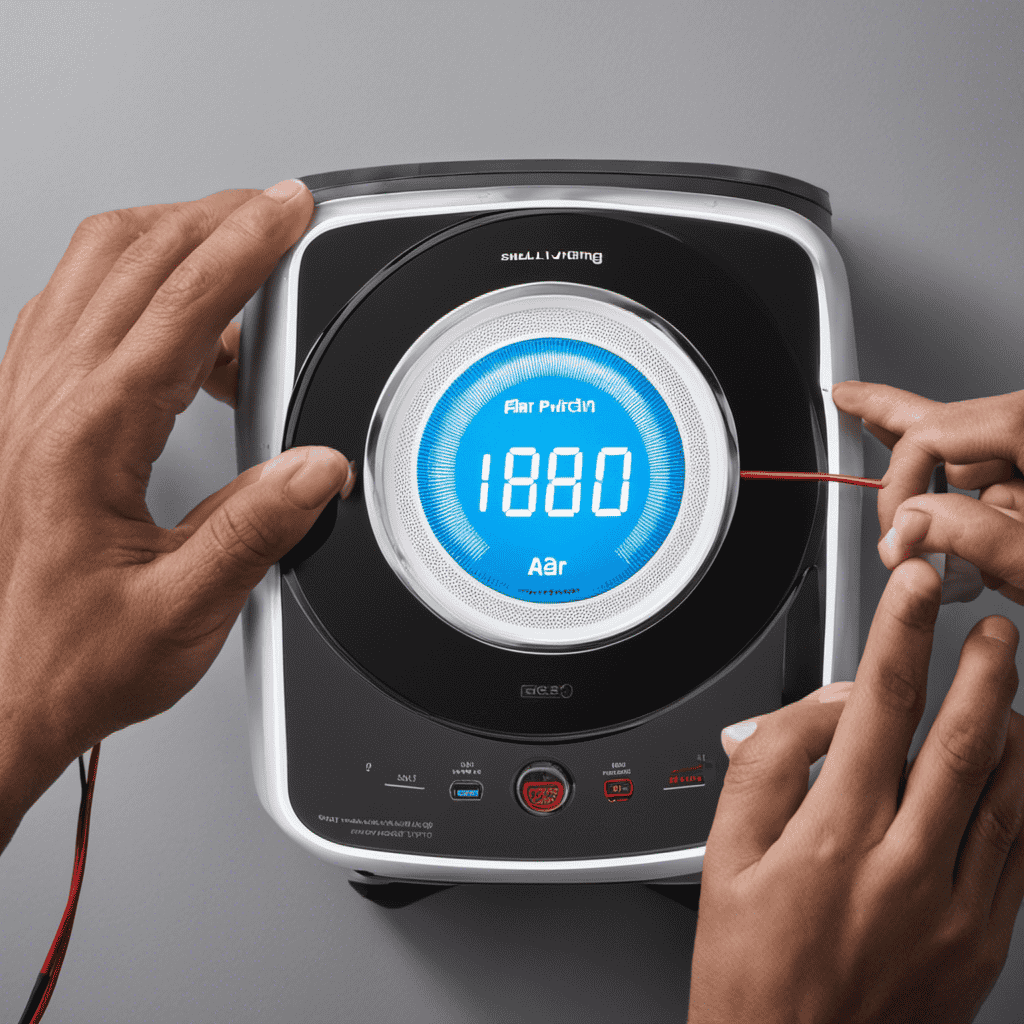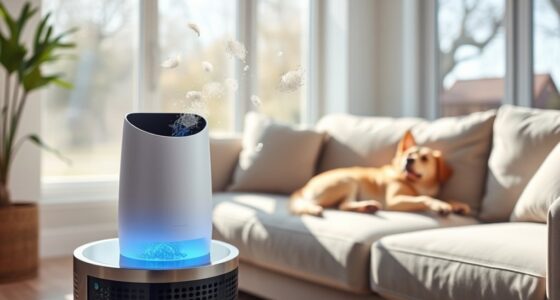Are you aware that ionizer air purifiers, typically utilized to enhance indoor air quality, may actually pose some adverse effects on our health?
In this article, I will explore the potential risks associated with using ionizer air purifiers.
From respiratory concerns and allergic reactions to negative effects on lung function and potential skin irritations, it’s important to understand the potential drawbacks before investing in one of these devices.
Let’s dive into the side effects and safety concerns surrounding ionizer air purifiers.
Key Takeaways
- Ionizer air purifiers can emit ozone, which can irritate the lungs and worsen respiratory conditions.
- Overexposure to ionized particles in the air can lead to respiratory issues such as asthma, bronchitis, and lung cancer.
- Ionizers can release harmful ozone gas, which can worsen respiratory conditions such as asthma and allergies.
- Negative ions emitted by ionizer air purifiers can have harmful effects on lung function and exacerbate respiratory conditions.
Health Risks Associated With Ionizer Air Purifiers
There are potential health risks associated with using ionizer air purifiers. These devices are designed to remove pollutants from the air by emitting negatively charged ions. While they can be effective in improving air quality, they can also have negative effects on respiratory health.
Studies have shown that ionizers can produce ozone, a harmful gas that can irritate the lungs and worsen respiratory conditions such as asthma and chronic obstructive pulmonary disease (COPD). In fact, the Environmental Protection Agency (EPA) has set limits on ozone levels to protect public health.
It is important to note that not all ionizer air purifiers emit high levels of ozone, and some models have been designed to minimize this risk. However, it is crucial to carefully research and select an ionizer air purifier that meets safety standards and does not compromise your respiratory health.
Respiratory Concerns Linked to Ionizer Air Purifiers
When it comes to the health risks of ionizers, one particular concern is the long-term respiratory effects they may have. Research has shown that overexposure to ionized particles in the air can lead to respiratory issues such as asthma, bronchitis, and even lung cancer.
These effects are often attributed to the release of ozone, a byproduct of ionization, which can irritate the respiratory system and cause inflammation.
Health Risks of Ionizers
The health risks of ionizers include potential respiratory issues and ozone exposure. Ionizer air purifiers are often marketed as a solution for improving indoor air quality, but they can actually pose hazards to our respiratory system, especially in children.
Studies have shown that ionizers can generate harmful byproducts, such as ozone, which can irritate the respiratory tract and cause coughing, wheezing, and shortness of breath. Children are particularly vulnerable to these respiratory hazards as their lungs are still developing and they breathe in a greater volume of air relative to their body weight.
Additionally, ionizers can release particles into the air, which may exacerbate respiratory conditions like asthma. It is important to consider these health risks before using ionizer air purifiers, especially in households with children.
Long-Term Respiratory Effects?
To truly understand the long-term respiratory effects of ionizer air purifiers, you should consult a medical professional who can provide expert advice based on your specific health concerns.
However, it is important to note that indoor air quality can have a significant impact on our respiratory health, especially in children. Studies have shown that exposure to poor indoor air quality can lead to a variety of respiratory issues, including asthma, allergies, and other respiratory infections.
Ionizers, while they may help remove some airborne particles, can also produce ozone as a byproduct, which can be harmful to the respiratory system when inhaled in high concentrations. Therefore, it is crucial to ensure that any air purifier you choose, including ionizers, meets safety standards and does not emit excessive ozone.
Allergic Reactions Caused by Ionizer Air Purifiers
I’ve been researching the effects of ionizer air purifiers, and I’ve come across some concerning information regarding respiratory issues, skin irritations, and rashes.
Studies have shown that ionizers can release harmful ozone gas, which can worsen respiratory conditions such as asthma and allergies.
Additionally, some individuals have reported experiencing skin irritations and rashes after prolonged exposure to ionizer air purifiers.
Respiratory Issues From Ionizers
Using ionizer air purifiers can potentially worsen respiratory issues. While these devices are marketed as effective in removing airborne particles, they release negative ions into the air, which can have negative effects on individuals with respiratory conditions. Negative ions can irritate the respiratory system and trigger symptoms such as coughing, wheezing, and shortness of breath. For people with allergies, ionizers may also worsen their symptoms by causing an increase in airborne allergens. Research has shown that ionizers can generate harmful byproducts such as ozone, which can further aggravate respiratory conditions. It is important to consider these potential side effects before using an ionizer air purifier, especially if you have pre-existing respiratory issues or allergies. Table below summarizes the potential effects of ionizer air purifiers on respiratory health.
| Effects of Ionizer Air Purifiers on Respiratory Health |
|---|
| Irritation of the respiratory system |
| Aggravation of symptoms for individuals with allergies |
| Generation of harmful byproducts such as ozone |
| Potential worsening of respiratory conditions |
Skin Irritations and Rashes
After discussing the respiratory issues caused by ionizer air purifiers, let’s now focus on another potential side effect: skin irritations and rashes. It is important to note that while ionizers are generally safe, some individuals may experience adverse reactions.
Skin dryness and inflammation are two common symptoms reported by these individuals.
The negative effects on the skin are believed to be caused by the release of ozone, a byproduct of ionization. Ozone can strip the skin of its natural oils, leading to dryness and irritation. Additionally, it can also trigger an inflammatory response in the skin, resulting in redness, itching, and rashes.
To minimize the risk of skin irritations, it is recommended to limit exposure to high levels of ozone by properly ventilating the room and ensuring the ionizer is used in moderation. Additionally, maintaining a proper skincare routine and keeping the skin moisturized can help alleviate any dryness or inflammation caused by the ionizer.
Negative Effects on Lung Function From Ionizer Air Purifiers
There can be negative effects on lung function from ionizer air purifiers. These devices work by emitting negatively charged ions into the air, which attach to particles and remove them from the air we breathe.
However, some research suggests that these negative ions can also have harmful effects on our respiratory system. Studies have shown that exposure to high levels of negative ions can lead to increased airway resistance, decreased lung function, and even exacerbation of respiratory conditions such as asthma and chronic obstructive pulmonary disease (COPD).
It is important to note that these effects may vary depending on individual susceptibility and the duration and intensity of exposure. Therefore, it is crucial to consider these potential negative effects on lung function when using ionizer air purifiers.
Moving forward, it is essential to explore the potential skin irritations caused by ionizer air purifiers.
Potential Skin Irritations Caused by Ionizer Air Purifiers
Exposure to high levels of negative ions emitted by ionizer air purifiers can potentially cause skin irritations. While these devices are designed to improve air quality, it is important to be aware of their potential side effects. Here are some key points to consider:
-
Potential allergies: Some individuals may be more sensitive to negative ions and develop allergic reactions when exposed to them. These reactions can range from mild itching and redness to more severe symptoms like hives or swelling.
-
Potential sensitivities: People with pre-existing skin conditions, such as eczema or psoriasis, may experience worsened symptoms when exposed to high levels of negative ions. These individuals should exercise caution when using ionizer air purifiers.
-
Individual variations: It is worth noting that not everyone will experience skin irritations from ionizer air purifiers. Sensitivity to negative ions can vary from person to person, and some may not be affected at all.
-
Proper usage: To minimize the risk of skin irritations, it is important to follow the manufacturer’s instructions when using ionizer air purifiers. This includes maintaining appropriate humidity levels and avoiding prolonged exposure to high concentrations of negative ions.
-
Consultation with a healthcare professional: If you have concerns about potential skin irritations caused by ionizer air purifiers, it is advisable to consult with a dermatologist or allergist. They can provide personalized guidance based on your specific needs and help determine if these devices are suitable for you.
Adverse Effects on Asthma Symptoms With Ionizer Air Purifiers
To minimize the worsening of your asthma symptoms, it’s important to be aware of the potential impact that ionizer air purifiers can have. While these devices are designed to improve indoor air quality, they can actually have adverse effects on allergies and asthma. Ionizer air purifiers work by emitting negative ions into the air, which attach to airborne particles and cause them to fall to the ground. However, this process can also lead to the release of small particles known as ultrafine particles, which can worsen asthma symptoms and trigger allergies. In fact, a study published in the Journal of Allergy and Clinical Immunology found that exposure to these particles can increase airway inflammation in individuals with asthma.
| Adverse Effects on Asthma Symptoms |
|---|
| – Increased airway inflammation |
| – Worsening of asthma symptoms |
| – Triggering of allergies |
Understanding the potential adverse effects of ionizer air purifiers on asthma symptoms is crucial for those living with this condition. It is important to consider other air purification options that do not produce ultrafine particles, such as HEPA filters, to ensure optimal indoor air quality and minimize the risk of exacerbating asthma symptoms.
Now let’s move on to the next section, where we will discuss the safety issues and concerns surrounding ionizer air purifiers.
Safety Issues and Concerns Surrounding Ionizer Air Purifiers
In my previous discussion about the adverse effects of ionizer air purifiers on asthma symptoms, I highlighted the potential risks associated with these devices. Now, let’s delve into the safety issues and concerns surrounding ionizer air purifiers, considering their effectiveness and environmental impact.
-
Effectiveness: While ionizer air purifiers can remove some airborne particles, they may not be as effective as other types of air purifiers, such as HEPA filters, in capturing smaller particles like allergens and mold spores.
-
Ozone production: Ionizer air purifiers emit ozone, a gas that can be harmful to human health, especially in high concentrations. Long-term exposure to ozone may lead to respiratory problems and worsen existing lung conditions.
-
Indoor air quality: Despite removing certain particles, ionizer air purifiers do not address other pollutants like VOCs (volatile organic compounds), chemicals, and odors, which can still affect indoor air quality.
-
Energy consumption: Some ionizer air purifiers consume more energy compared to other air purification technologies, leading to higher electricity bills and environmental impact.
-
E-waste and disposal: Like all electronic devices, ionizer air purifiers contribute to the growing issue of electronic waste, necessitating proper disposal methods to minimize their environmental impact.
Considering these safety issues and concerns, it’s crucial to weigh the pros and cons before choosing an air purifier for your home.
Frequently Asked Questions
Can Ionizer Air Purifiers Cause Headaches or Dizziness?
Yes, ionizer air purifiers can potentially cause headaches or dizziness. Some studies suggest that the release of ozone by these purifiers may irritate the respiratory system and trigger symptoms like headaches or dizziness.
Are Ionizer Air Purifiers Safe for Children and Pets?
Ionizer air purifiers are generally safe for children and pets. They effectively remove allergens from the air, reducing the risk of allergies. However, it’s important to choose a high-quality purifier and follow manufacturer’s instructions for optimal safety.
Can Ionizer Air Purifiers Remove Viruses and Bacteria From the Air?
Ionizer air purifiers can effectively remove viruses and bacteria from the air, providing health benefits. However, it’s important to be aware of the potential side effects, such as ozone production, which can be harmful in high concentrations.
Do Ionizer Air Purifiers Produce Any Harmful Byproducts?
Ionizer air purifiers emit harmful chemicals, such as ozone, as a byproduct. They work by releasing ions into the air, which can attach to particles and cause them to stick to surfaces.
What Is the Recommended Distance to Keep From an Ionizer Air Purifier for Optimal Safety?
I would recommend keeping a good distance from an ionizer air purifier for optimal safety. While they can be helpful in removing pollutants, there are potential health risks associated with prolonged exposure to high levels of ionized particles.
Conclusion
In conclusion, ionizer air purifiers may seem convenient for improving indoor air quality. However, it is important to be aware of their potential side effects on our health.
Some of these side effects include respiratory concerns, allergic reactions, negative effects on lung function, and potential skin irritations. These purifiers can pose risks and may even worsen asthma symptoms.
Moreover, ionizer air purifiers raise safety concerns. It is crucial to carefully consider the potential consequences before using them. Exploring alternative options for clean and healthy air in our homes is also recommended.
Overall, it is important to weigh the benefits and risks of ionizer air purifiers and make an informed decision about their use.










